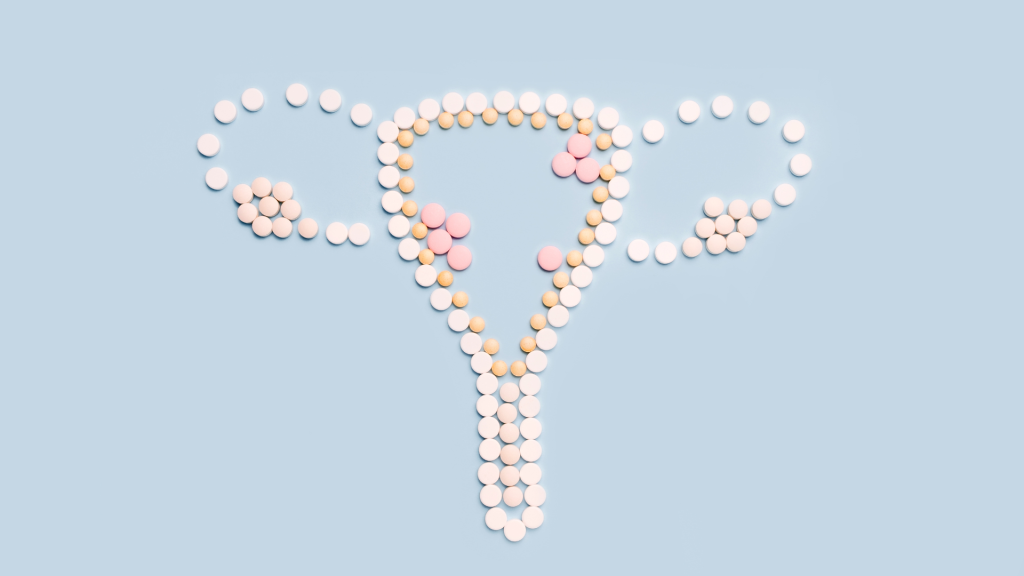By Dr. Sarah Bennett, NMD / April 9, 2024

In a time where medical knowledge and treatments seem to be progressing at light speed, women's health still appears to be overlooked by the medical community. Although every woman on the planet will go through menopause at some point in life, our medical schools fail to properly educate our doctors on how to evaluate and treat women during this time of life.
Based on a National Institute of Health research article, postgraduate medical residents were surveyed about their medical education on the topic of menopause. Twenty percent of surveyed postgrads reported not having had a single lecture on menopause during residency, which makes sense because only 6.8 percent of those surveyed reported feeling “adequately prepared” to manage the care of menopausal women (1).
As an American woman, stats like this are highly disappointing! Women comprise 50% of the population and deserve higher quality medical care.
At Natural Med Doc, women’s health is our primary focus. Our passion is providing our women with quality, evidence-based naturopathic medical care.
Menopause is a stage of life that all women go through. In fact, over 1 million women will transition into menopause this year (1).
Most women enter menopause between the ages of 45 to 52 years old (2). It is demarcated by the cessation of menstrual cycles for 12 consecutive months, an increase in the lab markers LH & FSH, a drop in female sex hormone production ( estrogen and progesterone), and often presents with distressing symptoms such as hot flashes, night sweats, mood swings, weight gain, skin and hair changes, anxiety, brain fog, vaginal dryness, and pain with intercourse. Not to mention the stigma of “getting old”, despite the fact women are living longer, with nearly ⅓ of the lifespan lived being after menopause!
Due to social norms, healthcare inequity, and poor education, menopause is overlooked and even ignored.
The good news is that there is a simple and natural solution. Bioidentical Hormone Therapy (bHRT). bHRT is a safe and affordable therapy that quickly resolves menopausal symptoms and helps prevent chronic diseases down the line.

Menopause is not a single event but a gradual process that unfolds over several stages, marking a significant transition in a woman’s life. Understanding these stages can help demystify the experience and prepare women for the changes.
The menopause journey typically begins in a woman’s 40s with the perimenopause stage, which can start years before a woman has her final menstrual period. During perimenopause, the ovaries gradually produce less and less estrogen, leading to changes in menstrual cycles that may become longer, shorter, irregular, heavier, or lighter in flow. Women might start experiencing menopausal symptoms such as hot flashes, night sweats, sleep disturbances, mood swings, palpitations, and changes in sexual function during this time. Perimenopausal symptoms can vary significantly among women and can last anywhere from a few months to several years.
Menopause is pinpointed retrospectively, with a typical onset occurring between the ages of 45 and 52 (2). The transition into menopause signifies the end of reproductive years, determined by the cessation of menstrual cycles for 12 consecutive months. During this time, the ovaries cease to function, resulting in significant and permanent drops in female sex hormones ( estradiol and progesterone) and a rise in the lab markers LH and FSH.
While some symptoms may begin to ease, such as mood swings, menstrual irregularities, bloating, palpitations, and breast tenderness, new ones typically begin to present. Common menopausal symptoms include hot flashes, night sweats, pain with intercourse, vaginal dryness, hair and skin changes, weight gain, brain fog, urinary issues, sleep dysfunction, and more. The numerous adverse symptoms occur due to the drop in female sex hormone production. This stage marks a significant biological milestone for women that is often physically and emotionally challenging.
Following menopause is the postmenopause phase, which encompasses the rest of a woman’s life. Longer lifespans have resulted in women living, on average, about ⅓ of their lives in this stage. Postmenopausal women are no longer at risk of pregnancy, but they may continue to experience symptoms of estrogen deficiency. Long-term dangers of reduced estrogen levels include increased risks for osteoporosis, bone fractures, dementias, cardiovascular disease, and changes in metabolic profile leading to an increased risk of diabetes. However, not all changes are negative; many women feel a sense of freedom and relief in this stage, finding more time for themselves and new avenues of fulfillment beyond their reproductive years.
Each stage of menopause presents its unique challenges and experiences. Understanding and recognizing the signs and symptoms of each phase can empower women to seek the care and support they need. By addressing menopause openly and proactively, women can navigate this natural life transition more comfortably and with a greater sense of control.
Women need to understand that these experiences, while challenging, are normal and manageable. Talking openly with healthcare providers, seeking support from peers, and employing strategies such as healthy living, stress management, and bioidentical hormone therapy can help manage the symptoms of menopause and decrease the risk of related chronic diseases down the line. The transition into menopause is a natural life stage and can be navigated successfully with the proper support and understanding.

The popularity of Hormone Replacement Therapy (HRT) soared in the 1990s but plummeted after 2002 due to the Women's Health Initiative research study findings, which initially suggested more harm than benefits. Although the results were statistically insignificant and skewed due to numerous issues with the study, the results were published, causing widespread fear of HRT. This led to changes in prescription practices; ultimately, Hormone replacement therapy came to a screeching halt.
Since the Women’s Health Initiative, subsequent studies have repeatedly shown that hormone replacement therapy provides many health benefits for peri to post-menopausal women. These benefits particularly shine in not only menopausal symptom resolution but also in prevention, such as reducing the risk of cardiovascular disease, dementia, osteoporosis, bone fracture, metabolic dysfunction, and even mortality. Still, public and even medical perception remains unchanged, mainly impacting women's health choices, treatment availability, and quality of life.
There are many different forms of hormone replacement therapy. So which one is right for you?
Bioidentical Hormones are structurally identical to the hormones you naturally produce in your body and, therefore, provide effects most similar to your hormones. On the other hand, synthetic hormones are created from inorganic sources and often hold a higher side-effect profile.
At Natural Med Doc, we prescribe Bioidentical Hormone Replacement Therapy, which is natural and quickly individualized based on your specific needs.
When you think of menopause, you most likely think of estrogen or the lack of it.
Therefore it makes sense that estrogen replacement therapy is the number one therapy used to resolve the unpleasant symptoms associated with menopause quickly; Hot flashes, night sweats, vaginal dryness, pain with intercourse, and brain fog, to list a few.
In addition, estrogen replacement therapy, when implemented within five years of menopause onset, has been shown to reduce the long-term risk of developing chronic diseases such as cardiovascular disease, osteoporosis, bone fractures, metabolic dysfunction, dementia, and mortality.
Despite the fear caused by the women's health initiative, estrogen replacement therapy has been shown time and time again to have significant positive benefits for menopausal women, both in eliminating current symptoms and preventing disease.

Progesterone replacement therapy is often overlooked for all stages of menopause due to the fact it is viewed as a hormone of fertility. Since women in menopause are no longer in their reproductive years, they “ no longer need progesterone.”
This couldn’t be farther from the truth. Many types of cells other than those in our sex organs contain hormone receptors, including brain, muscle, and fat cells. This indicates that the effects of hormones, including progesterone, are more diverse than sexual function.
To further validate this point, numerous adverse symptoms present when progesterone is deficient and subsequently resolve when progesterone replacement therapy is initiated.
The characteristic symptoms of progesterone deficiency include fatigue, sleep dysfunction, mood swings, depression, anxiety, brain fog, menstrual irregularity, and pain.
In addition to low estrogen seen in menopause and post-menopause, progesterone deficiency is one of the most common hormonal imbalances treated at Natural Med Doc and can affect women of all ages.
The male hormone.
Wrong!
Testosterone is essential for optimal vitality of women as well. Women require less.
Again, testosterone is also a hormone often overlooked by conventional providers due to the view that it is primarily a male hormone. Unfortunately, even lab companies often don’t recognize that testosterone is essential for optimal health. Some lab companies even consider normal levels of free testosterone to be 0.0 pg/mL.
However, low levels of testosterone in women are frequently associated with low libido, fatigue, poor mood, low motivation, irritability, weight gain, and poor cognitive function. I could go on.
Testosterone replacement therapy is a safe and effective treatment for women to quickly resolve these concerns, igniting the desire center of the brain to engage sex drive, motivation, and energy. Testosterone helps build muscle mass, which is essential to progressing with weight loss and toning.
Low levels can affect women of any age.

Menopause represents a pivotal stage in every woman's life, marking the end of reproductive years and bringing significant physiological and emotional changes.
Despite its universality, the topic remains inadequately addressed within the medical community, as highlighted by concerning statistics on postgraduate medical education.
This article aims to shed light on the stages of menopause – perimenopause, menopause, and postmenopause – and the array of symptoms women may face during each phase. It also delves into the misconceptions surrounding hormone replacement therapy, particularly the distinction between bioidentical hormone replacement therapy (bHRT) and traditional forms, underlining the importance of individualized, evidence-based approaches in managing menopausal symptoms.
By offering a comprehensive understanding and addressing the myths and fears associated with menopause and its treatment, this article serves as an essential guide for women navigating this natural yet complex life transition, advocating for improved healthcare support and quality of life.
Hello, my name is Dr. Sarah Bennett, NMD!
I am a naturopathic physician licensed in the state of Arizona currently practicing at my office in Scottsdale, AZ. I received my degree from Southwest College of Naturopathic Medicine, did a year residency at Keystone Natural Family medicine, and received additional training for aesthetics & anti-aging at National Laser Institute.
My passion and fascination for natural medicine began during my undergraduate studies at Indiana University where I got a dual degree in neuroscience & psychology.
I saw how a preventative approach could help you live a long and youthful life. Since then I have dedicated my life to serving others to understand the latest medical trends.
I spend my spare time running, hiking, rock climbing, camping, testing out new diets, and reading books on latest medical trends / listening to podcasts to find the latest nuggets of knowledge to improve the quality of life for my patients. I look forward to serving you!